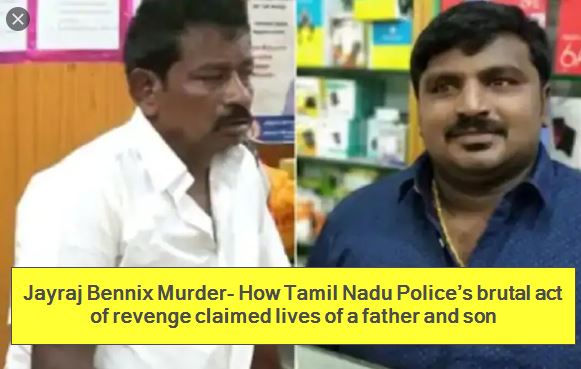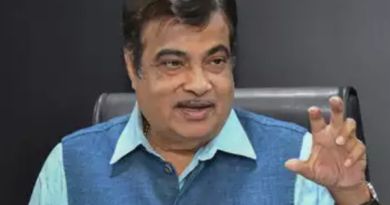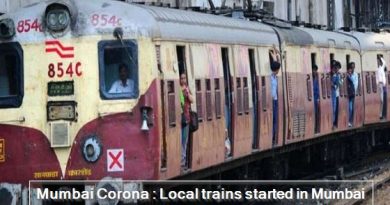Jayraj Bennix Murder- How Tamil Nadu Police’s brutal act of revenge claimed lives of a father and son
Historically, the Tamil Nadu police is notorious for highhandedness and third-degree torture methods.
The death of a father and son due to alleged custodial torture in Sathankulam town near Thoothukudi in Tamil Nadu has sparked rage across the state. The Tamil Nadu Traders Association downed shutters across the state on Wednesday. Victims were traders belonging to the Nadar community, a socially and politically powerful community in southern Tamil Nadu.
What was the series of events that led to the deaths in police custody?
P Jeyaraj, 62, who worked at his mobile shop at Sathankulam town, was taken in custody on June 19 evening.
Jeyaraj allegedly made some critical remarks about a police patrol team on June 18 for insisting shop owners to shut shops early for lockdown rules. An auto driver had informed police about remarks and the police team had come the next day to take him in custody. After an agitated police team had taken Jeyaraj in custody, his son, J Bennix, 32, followed the police team to the station.
At the Sathankulam police station, a senior police officer said, Bennix saw his father being physically harassed by an officer. An agitated Bennix questioned the officer, tried to stop the officer or pushed him to protect his father in his 60s. “It had provoked the police team, they thrashed both father and son for hours. There were two sub-inspectors and two constables in the torture team. A total of 13 officers were there at the station during the incident, including volunteers part of Friends of Police,” the officer said.
The alleged lockdown violation charge on Jeyaraj was something that would have got him a maximum of three months imprisonment if he was found guilty.
What happened the next day?
June 20. Jeyaraj’s family who waited outside the station till midnight got to see the father and son in the morning in “bad shape.” They were taken to the Sathankulam government hospital. Jeyaraj’s veshti and Bennix’s pants were fully soaked in blood. They had to keep changing lungis at the hospital due to severe bleeding. Policemen asked the family to bring “dark colour lungis”.
After three hours at the hospital, they were then taken to Sathankulam magistrate court.
Joseph, Jeyaraj’s brother in law who witnessed the scene, said the magistrate waved his hand from the first floor of the building as the police team stood outside. Both were sent on remand to Kovilpatti Sub Jail in a few moments.
The family had no news about the father and son till June 22 evening, when they were shifted to the nearby government hospital. Due to continuous bleeding and severe external and internal injuries from alleged lock up torture, Bennix died late evening on June 22, and Jeyaraj died in the wee hours on June 23.
What action has been taken?
Even as two FIRs have been filed, no officer has been booked for murder charges. Following the outrage and protests, four police officers including two sub-inspectors have been placed under suspension. The station inspector has been transferred. A judicial inquiry is in progress, post mortem report has been submitted to the Madras High Court in a sealed cover, and the court is waiting for a report from police.
The state government has announced a compensation of Rs 20 lakh for the victim family. DMK’s Thoothukudi MP Kanimozhi declared a compensation of Rs 25 lakh for the family.
Is there a communal angle?
Jeyaraj’s family belonged to the Nadar community. Multiple accounts from witnesses, relatives of victims and police show that the case had no direct communal angle but it was a brutal revenge by police officers, first for Jeyaraj’s alleged remarks against the police patrol team and for Bennix’s alleged attempt to physically stop, push away, an officer who was beating his father.
[amazon box=”B084J1V2SX” “small”]
Are such incidents prevalent in Tamil Nadu police?
Historically, the Tamil Nadu police is notorious for highhandedness and third-degree torture methods. Senior officers would call it a normalised practice for several decades, from the British era.
In Chennai city, it is a normalised practice for police sources to release photos of the accused in police custody with fractured arms and legs. “Slippery toilets” at the station would be cited as a reason for their fractures, the same would be reported to the magistrate during the remand process, a normalised extra-judicial punishment “to criminal elements.” Like in many states, it is to be noted that there are often a handful of senior-most officers at the top level who would be endorsing such extra-judicial practices in private talks for their flawed understanding about criminals and their origins.
Did the judiciary too fail in this case?
K Chandru, a retired judge of Madras High Court, said even during the emergency, people had the right to approach the court. “But the latest lockdown scenario had shifted full powers to the police and bureaucracy. That when the High Court itself talks about the pandemic being equal to Emergency and that the officials must be given due weight of the situation, it sends a wrong signal to the magistracy. There are innumerable instances where they deviate from protecting the constitutional rights of the citizens.”
In this case, the judicial magistrate should be dismissed from service for judicial impropriety and misconduct, the former Justice said, adding it was his job to check on injuries and bleeding, he should have raised questions to police and accused instead of remanding them with an order saying “no complaints”.




